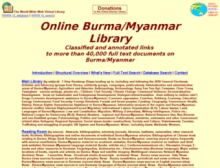Resource information
EXECUTIVE SUMMARY
Having signed the United Nations Framework Convention on Climate Change (UNFCCC) on 11 June 1992
and ratified the convention on 25 November 1994 and the Kyoto Protocol in 2003 as a non‐Annex 1
party, Myanmar is fully aware of the causes and potential impacts of climate change. Hence, whilst
undertaking political reform and aiming at rapid economic development, Myanmar is striving to reduce
its greenhouse gas (GHG) emissions. The government of Myanmar has recognised the potential of the
REDD+ initiative to contribute to green development by protecting global environmental resources
(forest carbon stocks, but also biodiversity), helping to reverse land degradation, helping to improve the
livelihoods of the rural poor and aiding adaptation to climate change.
Although still largely a poor country, Myanmar is rapidly opening up to Foreign Direct Investments (FDI)
in the energy, mining and agricultural sector. Unless astutely managed, economic growth may have
negative impacts on the environment and the natural resource base. In addition, climate change
threatens to reverse socio‐economic advances. Recognizing these inter‐related challenges, the
Government increasingly views the forestry sector as a key component and driver of sustainable and
climate resilient economic growth and rural development. Myanmar has significant potential to reduce
its forest carbon emissions, and enhance and sustainably manage its forest carbon stocks, by
implementing REDD+ activities...


